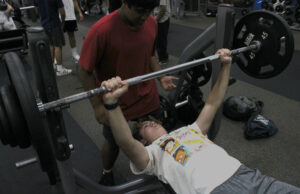Modern Escapism

Generation Z (born from 1997-2012) may not be facing the struggles that past generations have, but that does not mean that school is any less stressful for these students. According to the American Psychological Association, 45 percent of all teens said they were stressed by school.
Data collected from the American Psychological Association for the Stress in America Survey shows that the stress levels experienced by teens rival that of adults. Teen’s stress can be dangerous and unhealthy, and is sometimes underestimated, which can deepen its impact. The most common sources of teenage stresses are school (83 percent), the future (69 percent) and family finances (65 percent). Many high school students reported feeling angry and appearing visibly stressed. Teens reported lying awake at night, overeating and skipping meals due to their stress levels.
Students find coping with this stress to be difficult and often turn to external sources to help alleviate the burden, including exercise, religion, self-medication and screens.
Sweating out the stress
Harvard Medical School’s Health Publishing states that, “Exercise reduces levels of the body’s stress hormones, such as adrenaline and cortisol. It also stimulates the production of endorphins, chemicals in the brain that are the body’s natural painkillers and mood elevators.”
With the stress that is presented in our modern society Paige Henry, freshman, finds that even exercising can help alleviate the stress she deals with on an everyday basis.
“Two years ago, the summer before eighth grade, I started exercising regularly…it’s definitely helped me relax, especially because it releases endorphins. It just really helps calm my whole body down,” Henry said.
From agility to weightlifting Paige does different exercises, allowing her to replenish her mind and get ready to do all her activities.
“Sometimes I’ll have so much homework, and I’ll save it for after workouts, because I feel like my mind is refreshed and I’m not in a very panicked mode,” Henry said.
Henry works out three times a week and is planning to start a new form of exercise at Studio Barre by the Newbury Park Library. Henry finds that if you want to start exercise as a form of relief, “just go for it. Even if you only want to go for stress, just put all your effort into it because it will help you personally.”
Kian Alamir, junior, also uses exercise to relieve stress and to help balance out his busy lifestyle. “When I go to the gym or go surfing or go hiking, I 100% focus on that, I don’t think about anything else. Forcing myself to focus doesn’t allow me to think about the other stresses in life,” Alamir said.
Alamir makes sure to stay healthy and fit, exercising frequently both at home and at the gym. When he does not have access to the latter, Alamir runs or uses his punching bag. “I’m told, scientifically, it boosts endorphins, and makes you happy,” Alamir said. “It makes you tired but it makes you feel better in your mental state.”
Alamir feels the pressures of high school life frequently — whether it is balancing social life with school, preparing for his future in which he hopes to study law by participating in mock trial or juggling his many AP and IB classes.
“What’s great about (exercise) is that you are not only relieving stress, you are literally making yourself healthier so you can do more things. When you exercise, you feel proud of what you’re doing, like you have accomplished something positive. It boosts your self esteem,” Alamir said.
Rebooting the mind
Many teenagers today rely on their screens as a short-term solution to a long-term accumulation of stresses. According to Pew Research Center in 2018, 95% of teens have access to a smartphone and 45% say they are online “almost constantly.” School, family life and even just getting adequate sleep can become major issues that the calming blue screens seem to keep under control. Keene Debler, freshman, uses screens to distract himself from his burdens. “Watching things is relaxing because I am invested in it and forget about worries in my life,” Debler said. Debler spends around three hours a day on his phone or watching TV. “I am on my screen about fifty percent of the time to escape life, but the rest is just for entertainment which could also be an escape from life,” Debler said.
Riley O’Leary, freshman, finds that using her phone helps her to temporarily relax. “I’m only a freshman and I’m already freaking out over schoolwork,” she said. “Phone usage, for me, can easily be a good distraction from everyday stresses.” O’Leary spends around three to four hours a day on her device, but is aware that this elongated time of scrolling can catch up to her in the long run. “I think that there is no way to escape unless you tackle the things worrying you, head on. The phone can’t solve those things for someone,” she said. “I usually wind up getting tackled by procrastination.” Though O’Leary realizes the repercussions that come with too much screen time, the short-term fix that it provides seems to make it worth it. “It’s a temporary distraction from the things nagging in my mind.”
Screens have been a way for people to relieve themselves of their daily stresses and escape since the beginning of computers. The universality of screens between age groups can be seen through freshman all the way to seniors.
Aaron Grossman, senior, spends around five to six hours a day using screens to play video games and watching YouTube. “(Screens) help me relieve stress by letting me focus on something other than my pressure. It also allows me to relax and have fun,” Grossman said. Most of Grossman’s sources of stress are school related: “IB and testing, theatre, choir, relationships with others and school drama.”
Grossman understands that video games play a conflicting role in his life, but at times the ends justify the means. “Without monitoring and specific limits, it can be more harmful than helpful. However, when controlled, it is very beneficial to tune out with video games,” Grossman said.
Turning to self-medication
To manage the psychological aspect of stress, many teens have resorted to self-medicating. Marijuana, in particular, has become prominent due to its relaxing effects. Many students find that their drug usage was triggered by stressful situations.
Blake*, senior, uses a wax pen to vape marijuana. “I use it to ground me and to relax on the weekends,” he explained.
“I primarily use (the wax pen) when I’m being swarmed by a lot of work, or when I’m having trouble with friends,” Blake said. “I find that it’s really good at making me worry less and it helps me rationalize the issues I’m facing, so I’d say it’s really effective for relieving stress.”
For Daniel*, senior, taking painkillers and smoking marijuana every day is his way of coping with mental health struggles. “I have generalized anxiety disorder, so I’m kind of a stressed out person and I got good at hiding it and I just used drugs as something as an escape from myself,” Daniel said. “Drugs just let me hide from a person that I was forced to see all the time. Whenever, I am high, I’m just hiding from myself. I wasn’t someone else. It’s impossible to be sad or anything when you’re high because you’re just having too much fun.”
Jane*, senior, began using medical marijuana to stymy her chronic pain, anxiety and depression. “My anxiety is caused a lot by school, the hyper competitiveness in our school, especially, and external factors relating to my family,” Jane said.
In terms of stress relief, Jane believes that it is an effective solution. “(Marijuana is) 100% effective, as soon as I smoke it, I’m just relaxed: all my worries and anxieties just fade away. I don’t overthink and I don’t stress about unrealistic things. I just am completely in a relaxed state,” she explained.
Even with other methods of coping with stress, Jane believes that without her medical marijuana card, she would be at a disadvantage. “I think I would be in more of a heightened state of anxiety. I think I could survive, but I’d just be a lot more anxious.”
Jane also believes that her medical marijuana usage helps her academic success. “I just think I would be way more overwhelmed with what I have to do. As soon as I’m calm when I smoke, I can do one task, and I’m not overwhelmed with all the tasks that I have to do. And I’m not an anxious mess.”
Finding solace in faith
With school, stress from home and the growing sense of disconnect that teens often feel, many turn to religion and faith to find solace during difficult times. A local youth group hosted through Calvary community church is a place for students to meet with friends, share inspirational stories, participate in service and talk about faith.
Ethan Ronk, senior, experiences stress from school, sports and family life. He is part of a subgroup of 15 Calvary members that meets every Tuesday night.
“It’s a good place to commune and be in fellowship together, and that helps me a lot,” Ronk said. “Having that community of people who feel the same way about certain things as you do, and having people that are there to lift you up and support you is always a great system to relieve stress.”
Within the Calvary church, there are three subgroups: the high school ministry, the main service and the elementary and middle school ministry. This allows the sermons to be catered to the specific demographic of worshippers.
“The high school ministry focuses on stresses that high schoolers may be going through, so we talk a lot about dealing with stress and dealing with certain things in certain ways,” Ronk said. The pastors are also open to talking with people and praying over them after sermons.
“There have been instances where I’ll have a super stressful week and there is a lot going on with school and sports, and then the sermon will line up to that.” Ronk said. The group just wrapped up an eight-week long series on the book of James, which was heavily focused on dealing with stress. “Having direct sermons that apply to high school life is really helpful when it comes to learning how to deal with stress with faith,” Ronk said.
Zain Kazi, senior, also turns to his religion as a release. “When I get stressed out with school and stuff like that, when I come home I just read the Quran and pray and kind of escape from all other distractions that are going on, and makes me feel more secure,” Kazi said.
As a part of the full IB diploma class, Kazi has consistently experienced the stressful dynamic that comes with balancing school, social life and personal health. “When I practice my faith, I feel like I perform better and I just feel more positive,” Kazi said.
Kazi is a member of the Muslim community, and is devout in his faith. “I follow most of all the rules of Islam. I don’t do all my prayers five times a day, but it’s like an escape — when I’m not feeling well, it’s something I look forward to like a guidance path.” Kazi tries to do the prayers as frequently as he can, makes sure to eat Halal and follows the five pillars of Islam which provide a moral framework for character in his day to day life.
Kazi also took a religious pilgrimage to Mecca last summer, during which he payed respect to the followings and passages of Mohammed. Kazi feels that these aspects of his religion enrich his life and help him balance his academics with his personality.
“We have our own youth group, and it’s good because it brings the community together,” Kazi said. “I didn’t really know many people that were my age in the community that were Muslim before, but the activities in the youth group where we volunteer at the food bank and soup kitchens also help us come closer together and share our personal experiences.” It is meaningful to him that he is able to bond with others who share his faith.
“It’s the whole idea of hope,” Kazi said when describing why he prescribes to Islam. “If I have religion by my side, God will make the whole process of my life a lot easier. It helps me find clarity in difficult situations.”
Therapy
Although people find that they are capable of finding ways to relieve their stress through their own methods, sometimes what they need is someone to talk to. Finding help from a medical professional or therapist can be transformative.



